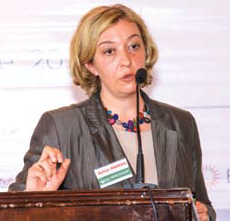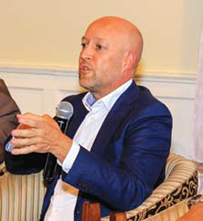 Our total membership represents about 80% of the global floriculture trade, so we have a good representation of the international market of cut flowers and potted plants. In our industry, it is important to have a collective voice that gives visibility to important topics, such as market access and sustainability,” explains Sylvie Mamias, Secretary General of Union Fleurs. The international floriculture trade association is based in Brussels, as one of its key roles is to represent the common interests of its members towards the EU institutions. “The impact of the start of the pandemic is a good illustration of our work. When such challenges arise, we are able to get the attention of governments and policymakers to make them aware of the specificities of this industry and channel support.” She adds
Our total membership represents about 80% of the global floriculture trade, so we have a good representation of the international market of cut flowers and potted plants. In our industry, it is important to have a collective voice that gives visibility to important topics, such as market access and sustainability,” explains Sylvie Mamias, Secretary General of Union Fleurs. The international floriculture trade association is based in Brussels, as one of its key roles is to represent the common interests of its members towards the EU institutions. “The impact of the start of the pandemic is a good illustration of our work. When such challenges arise, we are able to get the attention of governments and policymakers to make them aware of the specificities of this industry and channel support.” She adds
Market access
Mamias explains that one of the top priorities for the association is to promote seamless markets and trade and remove trade barriers along the supply chain. “We aim to facilitate this from production to consumption, with all the steps in between. Therefore, anything that can impact the flow of products along the chain is something that we try to bring attention to towards people with influence.” Over the past 60 years, Union Fleurs has successfully advocated the interests of the floricultural trade on these topics and influenced policy-making, resulting in many achievements that nowadays benefit the floricultural trade in their daily operations, such as phytosanitary requirements, duty-free tariffs, and market access conditions. Concerning market access, there has been a number of important developments over the years. “Since last year, there has been growing pressure on logistics, as a result of the lack of transportation. However, there are also more structural and longerterm developments, such as the sustainability of transportation. How can we ensure that flowers can continue reaching markets, but in a more sustainable way? Diversifying means of transportation and utilizing more sea freight, for example, would significantly reduce carbon emissions. Concerning these longer-term issues, we as an association can have more of an influence, and we need to think together to promote solutions that benefit everyone along the supply chain.”

 Brussels based multi-stakeholder initiative the Floriculture Sustainability Initiative (FSI) new and more stringent environmental and social criteria for producers was introduced. This criterion entailed enhancing the scope of the FSI Basket of Standards.
Brussels based multi-stakeholder initiative the Floriculture Sustainability Initiative (FSI) new and more stringent environmental and social criteria for producers was introduced. This criterion entailed enhancing the scope of the FSI Basket of Standards.